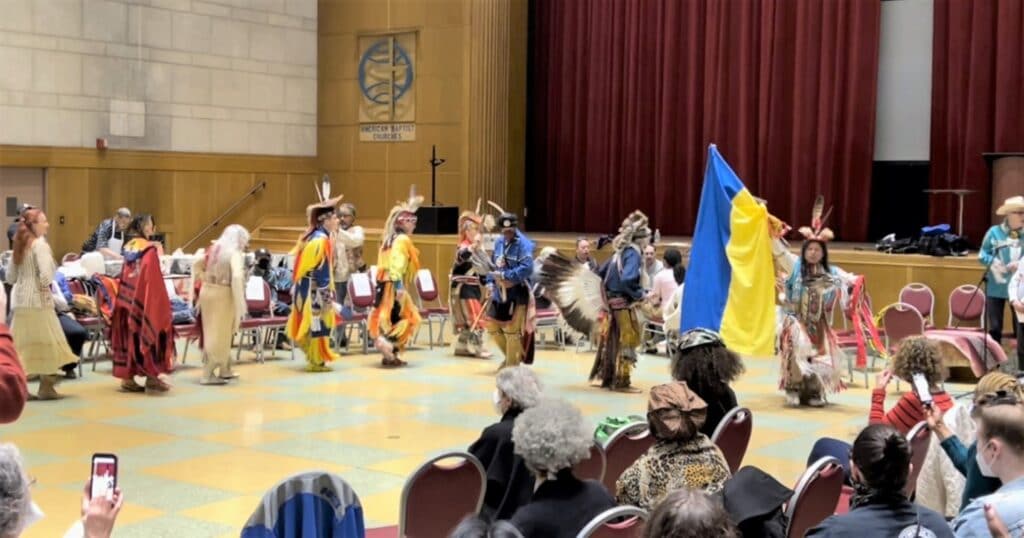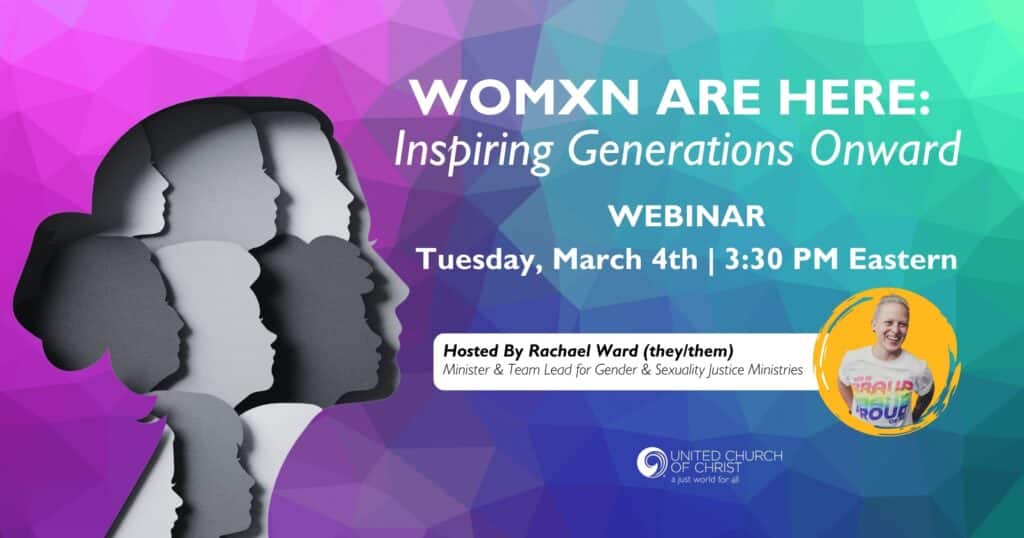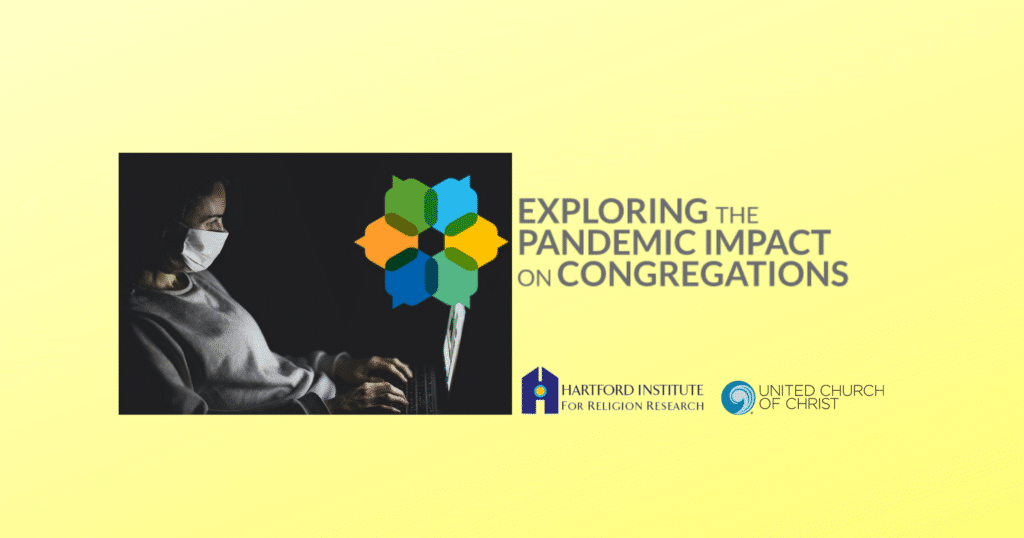Sharing space builds relationships in New York
Sometimes “doing justice” is as simple as “making space.”
New York City’s Riverside Church did just that March 20 when it hosted the Thunderbird American Indian Dancers (the “Thunderbirds”) for what is believed to be the 92-year-old congregation’s first American Indian powwow.
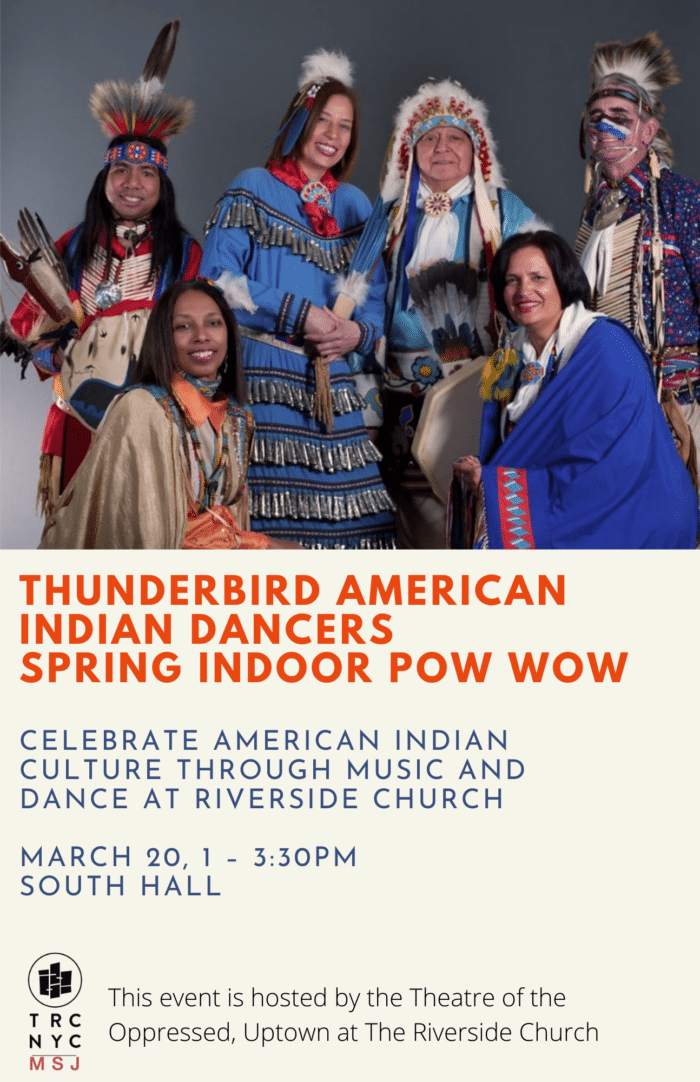
The Thunderbirds’ spring social gathering filled the church’s main social hall with the sound of singing and drumming and with color, most notably of dancers’ intricately embroidered, beaded, feathered and belled regalia, traditional clothing often passed down through generations.
Two colors that could not be missed: the yellow and blue of the Ukrainian flag. Carlos Eagle Feather waved the flag in the Grand Entry, then carried it folded over one arm in a dance honoring warriors – in support, he said, of Ukraine’s fight for freedom and its land.
They needed space
The request for space came from the Thunderbirds via one of the church’s many lay-led ministries, Riverside Theatre of the Oppressed Uptown.
Founding Director Jeremiah Drake knew the multi-tribal Thunderbirds professionally and had welcomed them into his regular Sunday-afternoon workshop space for small meetings and rehearsals.
His and other Riverside Church ministries use a Land and People Acknowledgement at the start of meetings to recognize that the church occupies land unceded by the Lenape people, and volunteers assembled a resource list for the church’s website.
“But we wanted to do more to support justice for American Indians, and to do it in response to their expressed needs,” said Drake, who said he’s an African American of mixed ethnicity including Cherokee.
‘We are still here’
When Thunderbird director and founding member Louis Mofsie mentioned the search for a venue for the spring powwow, Drake worked with Riverside staff to secure the space and to cover all related costs. “After all, it’s not our land,” he said.
“Social justice isn’t just about going to marches,” Drake said. “It’s also about opening up space. It’s a way of living the Gospel by just opening up the space.”
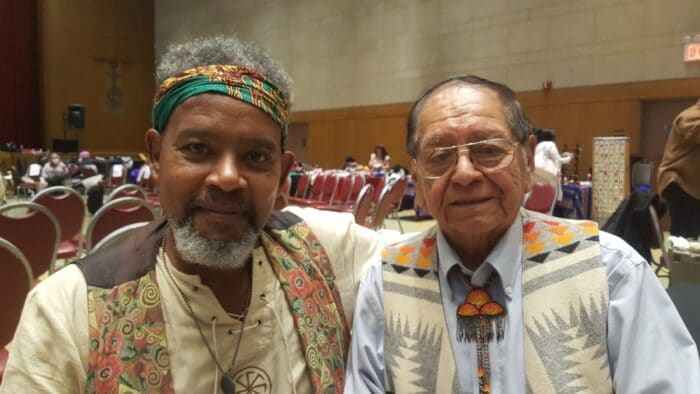
Mofsie, from the Hopi and Winnebago tribes, amplified, “This is important, to understand there’s a native population in New York City. Sunday’s powwow sent a clear message: ‘We are still here.’”
In the 2020 Census, 180,866 New Yorkers identified as American Indian or Alaska Native alone or in combination of races in a city of 8.8 million. That’s one in every 50 New Yorkers.
‘Same struggle’
Nearly 300 people poured into Riverside Church’s main fellowship hall for the powwow. They included congregants along with members and friends of the 59-year-old Thunderbirds, which is the oldest resident Native American dance company in New York.
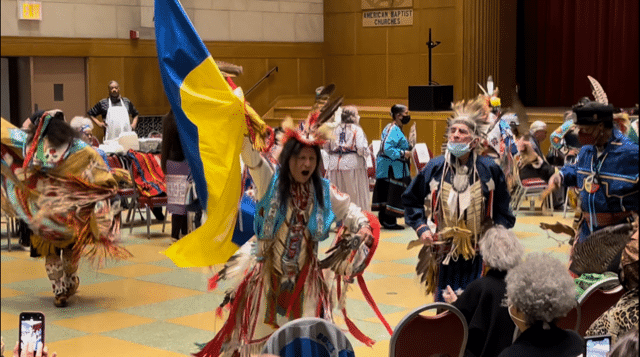
Riverside’s interim senior minister, the Rev. Michael Livingston, greeted the powwow, saying, “It’s an honor to host the Thunderbird American Indian Dancers, especially at this time in our nation when many people’s histories are being denied, ignored and repressed.”
Livingston, who is African American, added, “Hosting this powwow is a recognition of a debt owed to indigenous people in this land. We are in the same struggle to know our past and work together to create a just future.”
The 1,750-member Riverside Church is dually affiliated with the United Church of Christ and American Baptist Churches (U.S.A.).
An “interdenominational, interracial, international, open, welcoming and affirming church and congregation,” the church offers a diverse program out of a gothic structure that occupies two city blocks at the intersection of Manhattan’s Upper West Side and Harlem.
‘Heart of the people’
Riverside’s Densford Fund receives grant requests from programs serving American Indian youth, and recently approved $10,000 for the Thunderbirds’ youth programs. Several teenagers, along with at least one grade-schooler and one preschooler, were active at the powwow.
The powwow featured several opportunities for non-native people to join the dancing. Livingston and other Riversiders took part.
“We like for non-native people to come and for them to dance,” Mofsie said. “They begin to feel the heart of the people. Listening to the music, this is what the original people are — still here, sharing our culture.”
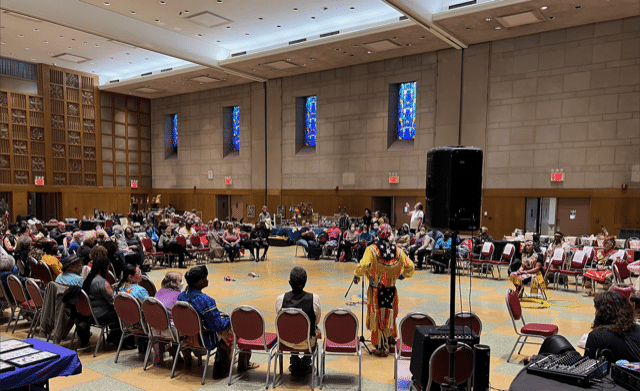
Content on ucc.org is copyrighted by the National Setting of the United Church of Christ and may be only shared according to the guidelines outlined here.
Related News
UCC celebrates Womxn’s History Month in March and beyond
Womxn's History Month is designated in March, and the United Church of Christ is celebrating....
Read MoreFive years later: How did the Covid-19 pandemic impact ministry?
On March 11, 2020, the World Health Organization officially declared Covid-19 a global...
Read MoreRev. Shari Prestemon nominated to serve as UCC’s Associate General Minister and Co-Executive, Global Ministries for Love of Neighbor Ministries
Re-entering the room at the March 2025 UCC Board Meeting in Cleveland to a standing ovation,...
Read More